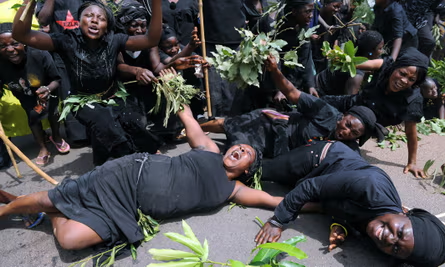
Benue Killings: Our Gory Ordeal, By Survivors

As President Bola Tinubu visits Benue State today, survivors of last Friday’s deadly attacks at Yelewata in Guma Local Government Area of the state have recounted the anguish they suffered in the attack perpetrated by armed herdsmen, which resulted in the death of over 200 persons, mainly women and children.
Several houses were also set ablaze by the marauding herdsmen who left blood and sorrow in their trail.
This came as Benue State governor, Hyacinth Alia, yesterday rejected calls for self-defence by residents, asking communities to support the establishment of a more robust community policing system.
This is even as the Chief of Defence Staff, CDS, General Christopher Musa, pushed for what he described as self-protection, in the form of civilian joint task force, CJTF, as it is in Borno, to defend local communities, just as the United Nations sought justice for victims of the attack.
I lost 20 members of my family — Michael Ajah
Narrating his ordeal, a survivor, Michael Ajah, who said he lost at least 20 members of his family to the attack, said: “My people, 11 of my family members died in this house, eight died in the other store, and some died here. My family members, 20 in number, died in the attack,’’
While stating that he also lost goods and property in the attack, Ajah said: “This is my store. Those shops are my stores. Those places are burnt. My house is up there, that place also is burnt. My store where I keep my goods is also burnt.
‘’They burnt everything. They burnt our food and my family members. What we came out with were our clothes we have on. And I, standing here, this is what I came out with. And this is the only thing that I have now. There is nothing else with me.’’
Describing how the attackers stormed their home late in the night during a heavy downpour, Ajah said: “On that very day, rain started in the evening, so we entered the house. I slept there. Around 10.20, we heard gunshots at the back there. So, before we realised that something was happening, Fulani men entered this place.
He added that he was certain they were Fulani men because he heard them speak.
“They were Fulani men, I heard them speaking, not that somebody told me. I was inside the room there and they surrounded the room. I escaped narrowly. My brother was burnt in this house. Some escaped. My dad was burnt in this house,” he said.
Another survivor, Bature Bartholomew, said he lost his younger brother, his sister-in-law, and his mother in the attack, adding that they were all burnt in their home.
Bartholomew, who also noted that his goods worth millions of naira were burnt during the attack, said: “I can’t say precisely the cost of what I lost but it runs into millions of naira. I store grains such as guinea corn, maize, soya beans, rice.
“My younger brother lived here. He’s no longer alive, he was burnt inside this house. He was burnt in this house, his wife, mother and many others were burnt in this house.”
8 members of my immediate family killed —Joseph
Another survivor, Joseph Kwagh, said he lost eight members of his immediate family, including his father, step-mother and six siblings.

He revealed that the attackers had sent prior warnings to the community, which residents had dismissed due to similar threats in the past that never materialised.
“On the day of the attacks, there were rumours that Fulani herdsmen sent messages across that they were coming to attack Yelewata, just like every other time, they have always sent threats of attacking Yelewata.
“We are used to hearing rumours of the attackers coming and most times, when they come, they meet stiff resistance from the military, police and local vigilantes stationed in our community and they go back. So, we had thought it will be same situation as it has been in the past.
“We thought it was like previous rumours that come and go without anything happening. We kept vigil outside our houses, talking and sharing stories. This time around, they were well-armed and hell-bent on killing anyone they see. That is why even babies were hacked to death.” Kwagh said.
According to him, residents of the community remained outdoor that evening, unaware of the looming tragedy, until they sought shelter in their homes as a result of a heavy downpour.
Kwagh said: “The rains started falling down heavily, all of a sudden, everyone rushed to seek refuge in their various shelters. My father, his wife (my step-mother), and six of my siblings now crossed to the other side of the expressway to the other house that was serving as grain stores to get shielded from the rains.

“At this point, there were gunshots everywhere in Yelewata, with pandemonium everywhere. Not long after the rain started, I heard cries and shouts across the other side of the road, where my father, step-mother and my other siblings had gone to seek shelter, but with the heavy rain, the noise was too loud to know what the shouts/cries were about.
“Not until someone came running towards our location with blood all over him and saying that they have come and are killing people, that was when I and my mother and the rest of my biological brothers and sisters decided to flee to the place where the security agents were also engaging the attackers from all positions. That was how I was able to escape with my mother and siblings to safety.
“The local vigilantes, the military and police really did their best, but I guess they ran out of ammunition, until reinforcements came from Makurdi.”
Kwagh said he later returned to the house where his relatives had gone and discovered their charred remains among the burnt stores.
“I was able to go to the very house my father and the other members of our family went to hide, where I discovered his charred remains, along with my step-mother and siblings. I was really devastated.
“We had foodstuffs in the store, where we normally go to restock our household, all burnt down along with our family members,” he recounted.
He also lamented the loss of not just his loved ones but also his means of livelihood, describing it as a devastating blow to his future.
“My worst fears are that, these deaths have created a vacuum that I cannot fill. I have lost the little investment in terms of my savings, my foodstuffs, seedlings for this year’s planting season and the fear of not being able to go back to farm again… because you never can tell what these attackers are capable of doing going further.
“My remaining surviving family is where I am gathering strength from. There is no one except me to cater for their needs. However, as far as there is life, there will be hope too,” he said.
He blamed the longstanding herder-farmer crisis for the tragedy, noting that tensions had escalated over disputes involving grazing on farmland.
Kwagh added: “Before this time, there has been cases of cattle grazing on our farmland and when we arrest the cattle and take to the police authorities, the compensation is never commensurate with the value or worth of crops destroyed by the grazing cattle. And we end up getting impoverished every season.
“Our elders decided to ask them to leave our land, so they can farm peacefully. That is our only crime. Nobody harmed them. They only said, since we are not allowing them to graze on our land, we too will not know peace. That is their threat to us.
“The world should be told that the peaceful place called Yelewata was massacred by Fulani attackers who have been waging war against us, unprovoked attacks, such that we are not able to go to farm to cultivate and grow crops, our only source of livelihood.”
READ ALSO: Nigerians Await Tinubu’s Action As Herdsmen Spread Terror In Benue, Enugu, Abia
Alia rejects calls for self-defence, backs community policing
Following the attack, Benue State governor, Hyacinth Alia, yesterday rejected calls for self-defence by residents, urging communities to support the establishment of a more robust community policing system.
Speaking on AIT News, Alia appealed for calm and warned against emotionally-driven responses that could escalate insecurity.
“Where you have people who just decide to work up because of sentiments and emotions that are attached to what is happening with us and within us, I think we’re rendering ourselves a bit more vulnerable. So, I wouldn’t advocate for self-defence,” the governor said.
Instead, he reaffirmed his belief in community policing as the most effective response to the state’s security challenges. “I would encourage us all to keep calling for community policing because it’s the only way. It’s only people from within the state and the local government who would understand what is going on with them,” he said.
Alia emphasised that external security forces might lack the local understanding necessary to respond swiftly to such attacks.
His comments came amid growing frustration among Benue residents and calls from civil society groups, including former Vice President Atiku Abubakar, for urgent government action and justice for victims.
Recall that former Senate President, David Mark, on Monday alluded to people defending themselves should the killings continue.









